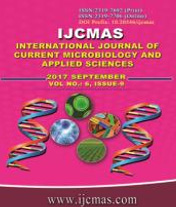


 National Academy of Agricultural Sciences (NAAS)
National Academy of Agricultural Sciences (NAAS)

|
PRINT ISSN : 2319-7692
Online ISSN : 2319-7706 Issues : 12 per year Publisher : Excellent Publishers Email : editorijcmas@gmail.com / submit@ijcmas.com Editor-in-chief: Dr.M.Prakash Index Copernicus ICV 2018: 95.39 NAAS RATING 2020: 5.38 |
Fusarium oxysporum f. sp. lycopersici is a soil-borne plant pathogen responsible for the development of Fusarium wilt which is one of the most important and destructive fungal plant diseases worldwide. The pathogenic strain of Fusarium oxysporum f. sp. lycopersici is isolated from the infested plant samples of tomato stem. The identification and confirmation of the isolate were done based on cultural characteristics, pathogenicity test. Out of eighty, Actinobacteria isolates which were collected from Agricultural College, Dharwad, 3 isolates (AUDT 626, AUDT 699 and AUDT 693) were showed a siginificant zone of inhibition 30.99 mm against Fusarium oxysporum f. sp. lycopersici. Glomus fasiculatum culture applied to the tomato plant showed 58.8% root colonization along with AUDT 622. Under challenge inoculation with a pathogen, AUDT 626 and both AUDT 626 and G. fasiculatum showed significant control of the wilt disease of tomato. In the present study AUDT 626 with G. fasiculatum showed 100% disease control with root length of 3.18 cm, shoot length 16.9 cm and total dry weight of 80 mg compared to disease control plant.
 |
 |
 |
 |
 |